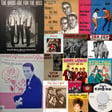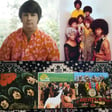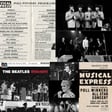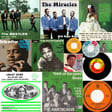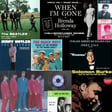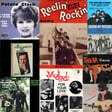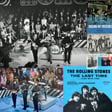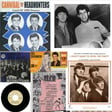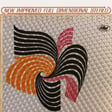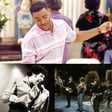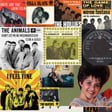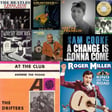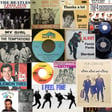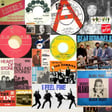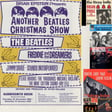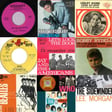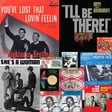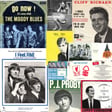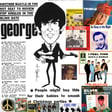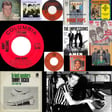Become a Creator today!Start creating today - Share your story with the world!
Start for free
00:00:00
00:00:01

November 1964 (side B)
More of the British charts for November 1964. Our first month in the history of the show without a Beatles song in either the British or American charts. It will be all the way to *next month* for us to Feel Fine again. Still some quality music as Petula Clark takes us Downtown, the Stones tell us about their Little Red Rooster and the Yardbirds talk about their little schoolgirl. Support this podcast at the $6/month level on patreon to get extra content! Create your podcast today! #madeonzencastr
Recommended
Transcript
Motivation and Beginnings with The Beatles
00:00:00
Speaker
the Beatles had this chant John Paul and George and probably then Stuart and Pete had this chant when things weren't going well which in their world wasn't very often because mostly it was an upward trajectory but nonetheless sometimes you know a bad night or the gig would you know didn't work properly or the amps broke or whatever I say where are we going fellas and they'd go to the top Johnny And I say, where's that fellas? And we say, to the top of most of the papa most. And I say, right. And we all sort of cheer up. Now then, boys, where are we going? To the top, bro. Where's that? To the top of most of the papa most.
Introduction to 'Toppermost of the Poppermost'
00:00:47
Speaker
Welcome to side B of October of 1964 here on Toppermost of the Poppermost. I'm Ed Chin. I'm Kid O'Toole. And I'm Martin Kuber.
Critique of Jim Reeves: Traditional or Outdated?
00:00:56
Speaker
So we start with the second week of November, November the 5th to the 11th. At number 33, there's a heartache following me by Jim Ries, which moved from 33 to 19 to 11. It's just more Jim Ries. Granted, you know why everybody's buying Jim Ries records, but from a perspective of 60 years later, I just don't need another Jim Ries record here. I look around.
00:01:23
Speaker
When there's a heartache following me,
00:01:49
Speaker
beautiful voice, kind of a traditional country voice. And this is another example, the Nashville sound. Pete Townsend would later cover this.
00:01:59
Speaker
believe it or not. And I have to admit, much as I love Pete Townsend, I like this version a little better, more of a traditional country sound. It's not exactly my cup of tea, but Jim Reeves definitely had a beautiful sound and but I can see why he had such a big following because it certainly had that natural sound where he appealed both to pop audiences and country audiences. <unk>s It's the typical Jim Reeves sound.
00:02:29
Speaker
Yeah, standard country and western song about a guy suffering through heartache, pretending that it doesn't affect him while he's turning himself apart. At least the guy in the narrative isn't talking about the fact that he's lost his pick-up or his dog, which is usual country and western fare. It's okay. Me and Kit I think like it a bit more than Ed. I haven't been a fan of most of these Jim Reeves records other than the Chet Atkins guitar, and especially considering we're looking at three or four months since Jim Reeves had passed. It's not a great record to me, but I don't think any of us are saying it's a great record. It's a good album track. Yeah. yeah It's a very smooth vocal and you know there are things to like about it but it's much less my cup of tea I think.
Freddie and the Dreamers: Christmas Ballad Blunder?
00:03:08
Speaker
At number 41 I understand by Freddie and the Dreamers which would move from number 41 to number 27 to number 29. It's nice to see Freddie trying something else but this isn't a great direction for him or the Dreamers. It's really nothing more than a limp ballad.
00:03:27
Speaker
I understand.
00:03:57
Speaker
Piano and drums backing work reasonably well, and there's a decent bop-bop backing, but then I don't get Old Lang Syne complete with the horns coming in at the back half of the song. Of course, they didn't write this song.
00:04:25
Speaker
It's a mediocre version of a good but not really great song. The original ah was from 1953, recorded by the four tunes, and then shortly thereafter by June Valley. I think they knew that Christmas was coming, so they put the old lang syne in there to try and get the Christmas sales.
00:04:45
Speaker
Oh, maybe that's why, because otherwise it made zero sense. All of a sudden, what does this have to do with anything? Maybe you're right, Murph, that makes as much sense as anything else. The only problem with them choosing the old Lang Syne as a Christmas slash New Year's record They didn't originate the old lang zine backing the g class in their nineteen sixty one version of the song is where that came from now they could have chosen the tune because they said oh this is gonna come out then but. yeah
00:05:16
Speaker
Who knows?
1964's Hits and Misses: Cultural Reflections
00:05:17
Speaker
Maybe. So there are that many covers of this song, huh? Wow. Not enough for a supercut, thank goodness. o This is less annoying than other Freddie and the Dreamer songs. I'm just not really a big Freddie and the Dreamer fan. It's still not great. At least Freddie isn't giggling or shrieking. I mean he sings it in a more straightforward way. I was grateful for that. The spoken word section was cheesy but kind of typical of the time. This dates back to 1953 and originally recorded by the Four Tunes which was an R and&B vocal duop group. Just a little side note doesn't have anything to do with the Beatles but
00:05:59
Speaker
The lead singer of the four tunes was the co-writer of For Sentimental Reasons, which of course was made famous by Nat King Cole. They're trying to do something different, but it's not them.
00:06:21
Speaker
At number 43, Last Night by the Mercy Beats, which would move from number 43 to number 40 to number 42. The original of this song was by Steve Lawrence. It's a nice enough pop song, but ever so slightly too sweet. The backing is translated to drums, guitar, and bass. I do like the acoustic guitar and the hand claps and finger snaps.
00:06:46
Speaker
And then I liked the changes when the vocal does that. I thought I bit. It's a nice recording in production, but it's not a great record. No.
00:07:26
Speaker
I really didn't care for this. The recording and arrangement were fine. I too like the hand claps. I mean that was catchy. Nice enough production and recording but otherwise pretty unremarkable song and the lyrics were ugh. I'll give you a beddy-ism here. I was sitting listening to this with my mother and she just said ugh.
00:07:48
Speaker
male chauvinistic lyrics and I have to agree I mean just so over the top the one part here all day long I tried to call her on the phone no luck and yet I knew she was home alone a weeping there on her bed big tears that made her pretty eyes red How could I break her heart that way? Foolishly part that way. I love her so, and now I want to die because last night I made a little girl cry. ah Yeah, this is pretty dated stuff. Very over the top lyrics. Well, put a Steve Lawrence vocal on top of it and see what you think about it then. Yeah, I mean, it's even worse. It's all right, but this is like the definition of dated. Sorry, Ken Michaels. Sorry, Ken Michaels.
00:08:40
Speaker
It kicks in my head again because the first thing I wrote was those lyrics with three exclamation marks. ah Standard stuff that you could easily forget a few minutes after hearing it. I will say the guitar solo I quite liked, but it was like it was there and then it wasn't there. I would have liked that for a bit longer. It would have been decent and made the song a bit better.
The Spencer Davis Group: Young Talent, Raw Energy
00:09:18
Speaker
I was just picturing the girl, the splayed on her bedspread with the tears just pouring ah over the bedspread and soaking wet. I was like, get out of here. Stop it. At number 48, I can't stand it by the Spencer Davis group, which would move from 48 to 47 to 48, early Spencer Davis group.
00:09:43
Speaker
Spencer Davis, Steve, and Moth Wynwood. It's not a great track, but it is a fun and energetic one. Good vocal, good guitar. It very much sounds like a band learning how to do something in the recording studio. The original was by the Soul Sisters. We run across the Soul Sisters before. It was recorded in 1963. Teresa, Trisha, Cleveland, and Anne Gissendanner, who were not actually sisters. The guitar solo I like, but it does take it ever so slightly into spinal taps. Give me some money territory. Oh, good old Spencer.
00:10:53
Speaker
I think this is the second spinal tap reference. I think you also said something went to 11.
00:11:04
Speaker
I'll tell you, Steve Wynwood was the star of this for me. He recorded this when probably was like, what, 14? Yep, 14. Holy cow. That is incredible. I agree, Ed, that this was a group finding itself at this point. Yeah, the guitar solo in the middle was good. It wasn't that outstanding yet. Also, the recording was not the best. It sounded a little muffled to me, but Steve Wynwood's voice, he did a couple of runs on here.
00:11:34
Speaker
that I couldn't believe. And for a 14-year-old, wow, this guy was meant to be a star. He was a blue-eyed blues slash soul singer. He had a future. I mean, you could see why this group wanted him at such a young age. So for me, it wasn't that it was such an outstanding song, but it was just hearing this star in training. For sure. I mean, you know, it's not so much the record, it's the history. And we will have at least one of many Beatles connections in a minute here. It's not a bad performance, because they're all doing really well at what they do. Muffinwood's bass and Pete York's drums, they lock in really nicely together. Spencer Davis does a decent job of the guitar. Steve's voice is amazing. Always has been. I don't think I've ever heard a song where Steve Wynwood sings.
00:12:27
Speaker
where his voice has not been flawless. In his organ as well he's good on this, so it's a nice early yeah Spencer Davies group song. We'll get some top ones from them soon. So the first of our Beatles connections. We'll have more as we go along and we see more of Steve Wynwood. Two here just real quickly. Steve Wynwood actually knew Linda McCartney and there is a marvellous photo. One of Linda's best color photos from that era because, you know, she liked to work in black and white is a so Steve Wynwood in 1968. Thank you, Ed, for sending that photo. Really? Thank you. I really like that photo.
00:13:11
Speaker
yeah I didn't know he was quite that hot in 1968. It's amazing, you know in the early 80s when he was having this big thing like the Valeries in the Higher Grounds, that was a solo artist. I was thinking, these are great songs. And then I thought to myself, hold on a minute, this guy at that point in the early 80s had had a career of over 20 years. And he was only in his early 30s.
00:13:34
Speaker
Yeah, well, he started when he was 14. That's astounding. And then Spencer Davis actually appears in a blink and you miss him appearance in magical mystery tour. He tells the story. The Spencer Davis group had just finished a tour and I was having a holiday staying with my wife and daughters at the pronunciation mark. Tewan Hale. Tewan Hale Pub in Perrin Porth, which was owned by the parents of our roadie, Alec Leslie. I knew the Beatles quite well, so when I heard that they were filming at the Atlantic Hotel in New Kay, I called up and asked Mal Evans what was going on. Mal immediately invited me over, so the whole family got into the mini and drove over there. Paul seemed to be directing for the film, and to my amazement, one of the film crew turned out to be John Mayall's wife, Pamela.
00:14:24
Speaker
We were immediately roped in to do a bit of off filming. And you can see us in a group shot at the back of the bus, which also appears on the back cover of the album. Very cool. Spencer took me to the magical mystery tour, to the screening down at Hanover Square. Yeah, I was living in Spencer's house with Pauline, his wife and two kids. And da Spencer was in the movie. He was on that bus, which was the movie was soundly panned.
00:14:53
Speaker
So he took me to the to the to this screening for their fan club presidents that the Beatles attended. and that They used to sing for them every Christmas, but this time they they just showed the film and the Beatles turned up for s scones or whatever they call those things, tea and tea.
00:15:10
Speaker
yeah at number 50 march of the mods by the joelos orchestra which would move from number 50 to number 35 to number 36 it's actually a pretty good song but i don't like this record that much at all a 76 trombones with a rocky and bullwinkle break kind of I'm really not sure who this record is aimed at. It's not bad, but it's a strange song to be in the charts. Marv, tell us a little bit about the mods subculture. We've talked about the mods and of course, Hard Day's Night. Are you a modder, rocker? No, I'm a mocker.
00:15:46
Speaker
So mod comes from the word modernist, which is a subculture that began in late 1950s London and spread throughout Great Britain, eventually influencing fashions and trends in other countries. yeah they They used to wear suits and jackets and As the mod subculture grew in London during the early to mid 1960s, tensions arose between the mods, often riding highly decorated motor scooters. So you'd have lots of wing mirrors and lots of badges attached to them and all these different decorated things on them. And their main rival was the Rockers, a British subculture who favoured rockabilly, early rock and roll, motorcycles and leather jackets.
00:16:27
Speaker
Yeah, rockabilly was a big part of it. For a period, the rockers ruled the roads and towns across Britain, creating a dominant and rugged presence with their motorcycles, leather jackets and rebellious attitude. Often spotted on powerful bikes like Triumphs and Naughtons, they roared through the streets, taking over highways and congregating at roadside cafes such as the iconic Ace Cafe in London.
00:16:49
Speaker
Their style was raw, and their gatherings at cafes and clubs became hubs of camaraderie and a shared defiance against societal norms. With their distinctive look and culture, the Rockers symbolised a kind of freedom that was both thrilling and intimidating to the more traditional society around them.
00:17:05
Speaker
For a time, they were the undisputed kings of the streets, their roaring engines a soundtrack to an era of unbridled independence and rebellion.
Mods vs. Rockers: A Cultural Clash?
00:17:13
Speaker
But soon, a new group was starting to emerge on the streets of London, the Modernists, later known simply as the Mods. Unlike the Teddy Boys, many of whom had served in the military through compulsory national service, this post-war generation was free from such obligations, Ed mentioned Quadrophenia, but I'd also say that another good film that touches on this in a couple of scenes is Battle By The Day, because they have it with the teddy boys against the mods. The mods were young, urban and driven by a desire to look forward rather than back. They embraced a sleek European-inspired style that favoured scooters, setting themselves apart from the rocker's aesthetic.
00:17:50
Speaker
As they gathered in clubs to dance to American R and&B, jazz and ska, the mods cultivated a lifestyle centered around fashion, music and a distinctly modern outlook that resonated with their sense of breaking away from the past. The mods lived for the day.
00:18:06
Speaker
The early mods were drawn to a dynamic mix of music that included the infectious dance rhythms of the twist, the sophisticated sounds of modern jazz, and the raw energy of American R and B. This eclectic musical taste set them apart as they frequented clubs to dance to these diverse styles.
00:18:22
Speaker
I also think they were early adapters of Ska. They were very anti-racist as well. They were very much into the black culture and the music and they bought all of that. I think that's one of the reasons why Motown made such a big splash on the charts. They had that culture that was so entranced with the music.
00:19:02
Speaker
What's this Lettkiss? Well, the record was also known by that title. Fingenka, the line dance is also referenced in the title of the song. So, Lettkiss records are Finnish dance records and it's the rhythm that makes them Lettkiss. Fingenka was a generic English name for the dance step itself and did not refer to any particular tune. Well, I can say a little bit more about that. I did some research on this. So apparently this dance, the finjenga, was a popular dance at the time. And this was the song, or at least one of the songs, that they would dance to. It's kind of a line dance.
00:19:45
Speaker
from what I can tell. And I came across a random message board and there was a post there from 2008 and somebody wrote, I was searching the web for the dance steps to March of the Mods um and came across your website.
The 'March of the Mods' Dance Craze
00:20:01
Speaker
I'm not sure what category March of the Mods comes under, but any chance you know the right steps. So everybody, if you are interested in doing this, pay close attention.
00:20:11
Speaker
here's how it goes right foot heel toe heel toe left foot heel toe heel toe both feet jump forward both feet jump back then march forward four steps and then start again and just keep repeating the same steps. And somebody else responded in this conversation and said, yes, that's exactly how we used to do it in the school playground in the 60s, ideally with as many people as possible side by side in a long line with linked elbows or arms around each other's waist. Wow. So maybe that's why this song ranked on the charts. It wasn't that it was such a banger, but it was this song that they would dance to. It it was March of the Muds.
00:20:56
Speaker
I mean, it's weird because it's instantly recognizable to me, even though I didn't know what it was called, because not from the mod culture about things. I was too small in the seventies. But yeah, it's sort of fun to be able to do something too. And I remember it still being played in school dances in the UK in the seventies in the early eighties, which is quite wow strange. Imagine if it had lyrics, it would have had Ross McManus on it. So everybody practice your dance at home. You can learn the march of the mods.
00:21:24
Speaker
You need to snip this and then we could put it out as a trailer and and then we want all these people to send us video clips of, you know, them doing this dance. You can actually go on YouTube. And I guess it's still being done. I found a few videos. It's being demonstrated, huh? Okay. Cool. Yep.
00:21:41
Speaker
huh And we do have a Beatles connection here. So this record was originally a record by a British band called the Executives. The drummer from the Executives would move on to Joe Lawson, his orchestra, and that drummer was the one who wrote March of the Mods. March of the Mods was originally released by the Executives, so this is a cover.
00:22:04
Speaker
The name of that drummer was Tony Carr. Tony Carr was the father of Roy Carr. Roy Carr was an enemy writer, and we know him because he was the co-author of The Beatles, an Illustrated record, which remains one of the most beloved Beatles books from that time period. Sure, yeah classic.
00:22:25
Speaker
Wow, it's a small world. So we got an Elvis Costello connection, we got a Beatles connection here, so. Jeez. We move on to the next week, the 12th to the 18th of November. At number 34, I'm Gonna Be Strong by Gene Pitney, which moves from 34 to 16. We covered this on the US side. At number 41, the second smash classic song from the era, Downtown by Petula Clark.
Petula Clark's 'Downtown': A Lively Success?
00:22:51
Speaker
which would move from number 41 to number 20. A great song, a great orchestra. The piano works very well. Very nice drums and all the backing is held together by Petula Clark's voice. All of this was recorded live in the studio.
00:23:08
Speaker
Strings, horns, woodwind sections, electric guitars, keyboards, and drums. The musicians assembled included eight violinists, two viola players, and two cellists. Four trumpeters, four trombonists, five woodwind players, flutes, oboes, percussionists, a bass player, and a pianist.
00:23:27
Speaker
Also present were famed session drummer, Ronnie Varell, not Bobby Graham, which has been reported in many places, female vocal trio, The Breakaways, whose backing singer credits would soon range from Dusty Springfield to the Jimi Hendrix Experience, and session guitarist, Big Jim Sullivan, Vic Flick, and Jimmy Page.
00:23:47
Speaker
Playing it live. Yeah. Wow. That is amazing. like And it was written by Tony Hatch, who was visiting New York in the autumn of 64. He spent three days there in search of material from music publishers for the artists he was producing. And he said he was staying at a hotel in Central Park and he said he was wandering down to Broadway and to Times Square.
00:24:12
Speaker
And he said he thought he was downtown and in New York. And he said he loved the whole atmosphere ah there and. The music st started coming, you know, really fast. He said he was standing on the corner of 48th Street waiting for the traffic lights to change. Looking toward Times Square, said the melody first came to me just as the neon lights went on. And he said he first thought of it as a sort of doo-wop R and&B song, which he thought at first he would pitch to the drifters.
00:24:44
Speaker
which I can kind of hear. You could sort of picture them doing it. He then said he gave Julie Grant the opportunity to record it, which she then turned down. But then, of course, Petula Clark got the song. What a stunner. For years, I thought this was a Broadway show song. I mean, I could absolutely picture this in a Broadway show. And it's amazing that this was recorded live, as you said. Petula Clark later said it was done in three takes.
00:25:13
Speaker
and that this was take two. It's impeccably arranged, produced, Petula Clark just nails it. What I find amazing is there's separation between the instruments. You got all that stuff playing at the same time and you can still hear, for the most part, the individual instruments where you want them to be heard.
00:25:32
Speaker
Exactly. I mean, you know, and they really tell the story of the song. And apparently the record company wasn't sure about releasing it because they said, well, it sounds like a very British record, particularly in America. They said, you know, is this going to be successful? But in a way, it is a British record. But I think it really encapsulates the excitement of going quotes downtown, meaning any city you're in. Petula Clark has that really bright eyed sound of of just that excitement of Stepping into the city and the bright lights and it can be in New York. It could be in Chicago It could be in London. It could be anywhere and it still sounds great today It's kind of amazing that she was 32 years old when she recorded it not the 32 was old But she sounds so young in that I mean she sounds like she could be like 20 or younger
00:26:24
Speaker
but She's a trained singer, isn't she? so i mean she probably Unlike most of the rock singers and pop singers that we listen to or are self-taught and have no formal training as such, she's got that training behind her from being in stage school that would make sure that she kept her voice at that level essentially a lot longer than than some of these other people that we come across, maybe.
00:26:49
Speaker
A couple of Beatles references here. The breakaways, the backing singers had played on the same bill as the Beatles, October 28th, 1962 at the Liverpool empire. That was the little Richard show, which was promoted by NEMS. Cool. And then Petula Clark before this point had primarily been a singer of French songs. Most of her work before this was in the French language. So she was equally facile in both French and English. During the recording in 1969 of Give Peace a Chance, she happened to be in Montreal. And as the story goes, she started singing in English and the French crowd booed her off the stage.
00:27:34
Speaker
oh She got very worked up, very sad over it. She discovered that John Lennon was staying in Montreal. She visited him. John apparently comforted her. And she is one of the voices, although she is close, if not completely inaudible, on Give Piece a Chance. o It's just cool that you can say that anyway, that you were you sang on Give Piece a Chance. Yeah, really. And we are going to have a supercut of Downtown. Some of the other versions include Sandy Shaw, Patty Duke, the Knickerbockers, Frank Sinatra, the B-52s,
00:28:15
Speaker
A band called The Cuban Heels, which I hadn't heard of before. It's a very sort of Devo-ish version. To Pow, Dolly Parton, Yo La Tango, Patti Lupone, Barry Manilow, and instrumental versions by Billy Preston and George Martin. Booker T and the MTs also did a cover of it, so. cool Wow. Boy, that's a diverse group there.
00:30:45
Speaker
Waiting for you tonight, downtown
00:31:06
Speaker
Down, down, down
00:31:58
Speaker
At number 42, the door is still open to my heart by Dean Martin, which would go from 42 to 43. I like but don't love the original version from 1955 by the Cardinals. That's a nice and soulful record if just a touch too smooth. I would say listen to that. Don't listen to this. Wow. I dislike this record. All of the things I dislike about the croon of this era are here. Overbearing backing vocals, terrible strings, horribly overdramatic overplayed opening, almost slurred, but not quite drunk Dino lead vocal. ah I guess the drums are pretty good, but they're fighting against the rest of the record instead of holding it together.
00:32:40
Speaker
Yeah, I agree. The original is better. It's not my favorite. I thought the original was a little too slow. I would have sped up the tempo a little bit. But other than that, yes, this version, as soon as I heard the way over dramatic opening with the overdone backing singers, the swell of the orchestra and the strings. I thought, uh-oh, this is not going to be good. And I was right. They didn't know quite what to do. They thought, all right, we don't want to alienate Dean Martin's core audience. Though, I'm sorry, older audience that love the croony Dean Martin, but we want to update him a bit. So we'll have a little bit of like a fat domino-ish rock.
00:33:25
Speaker
be just a little bit like a facsimile like tempo of rhythm pattern. So we'll just kind of smash them together. Maybe we'll even throw in a little bit of a country sound and we'll just mash it all together. And throw in some gospel backing as well. Exactly. We'll throw in that and we'll just sort of mash it all together and appeal to everybody. And boy, that doesn't work.
00:33:50
Speaker
And as you said, as Dean Martin does his little slurring, it just doesn't work at all. I agree, really didn't like this. The song was just all over the place. Either do the crooning thing, stick with the classic Dean Martin sound, or just don't do it at all. Oh, dear.
00:34:50
Speaker
Like you said, they've tried to update Dean by mashing all of these things together where, if they really wanted to try and update him, pick a lane to go in. Merging all these four things together, all different styles, sometimes merging things together works, sometimes it doesn't, especially when none of the instruments work with each other either. I think I would have liked them to have pulled everything else away, go all out on the soulfulness of it,
00:35:15
Speaker
And if you've got to have Dean there, at least have him where he's been good singy Dean and not the slaring, almost drunk sounding Dean that could be irritating at times. Or for that matter, get Dean off there and give it to Ray Charles. Yeah, there you go. Ray Charles might have saved the record, but even Ray Charles could have had a bad version of it, I think. And those lyrics, we can't blame Dean Martin for that, but you're as close to me as two is to three.
00:35:45
Speaker
Brilliant. And I told Marv, is there anything else you can think of other than that infamous dad joke? Why was six afraid of seven? Because seven, eight, nine. Ha ha Good Morning Little Schoolgirl by the Yardbirds, which would stay at number 49 for this week and the next. It's a blue standard. This version is ever so slightly cheesy. Larry Williams recorded the early version of it January 6th, 1958 at radio recorders in Hollywood, California.
00:36:36
Speaker
It sounds like early British Invasion Blues. Nothing overly inventive, but it rocks enough, and the backing is good enough, particularly the guitars and the drums. Not a great record, but okay. The guitar is probably what saves it. The lyrics, that hop soda shop rhyme. Not quite as bad as the 2-3 thing, but ooh. Yeah.
00:37:07
Speaker
To the music of the rock and roll
00:37:18
Speaker
Some of the lyrics are a little creepy, but not horrible. This was first recorded in 1937 by Chicago Blues vocalist and our harmonica pioneer, John Lee, Sonny Boy Williamson. And I don't think it's known who wrote it. It's an old, old blues song. This version, it's kind of blues crossed with pop. And I like the Clapton solo. That's not one of his all-time best, but it's good. ahead I did not like the Woos. That was cheesy.
00:37:48
Speaker
Neither did Clapton. Clapton later said that they recorded it because they were looking for material for their album and that this is a song that they knew. They said they remembered this good morning little schoolgirl from a rather obscure R and&B artist. He said a friend of theirs had it on a one player. So they rushed in and recorded it. And he later said in his autobiography, they sounded pretty lame. We just sounded young and white.
00:38:16
Speaker
And even though our second single, our cover of a rock version of Good Morning Little Schoolgirl sounded much better, I felt just that we were falling short of the mark in some way. This was not something I felt just about the Yardbirds, but about other bands that I admired, like Man for Man, the Moody Blues, and the Animals, all of whom were far better alive.
00:38:36
Speaker
than we were on recordings, and that may have been part of it, but also, I don't know, I just think maybe they were kind of trying to find themselves at this point, but this is okay. Definitely, it was like they were trying to do some Chicago blues, all but also trying to appeal to a pop audience, and not a great combo in this case.
00:38:55
Speaker
you can already hear in Eric's quotes about this. He's growing disdain for the poppy way that he feels that the Yardbirds are going to go, because at this point, he was very much a blues purist. So the woohoos and all these little poppy bits that went into songs were irritating him, and that's why he'd end up leaving and going to John Mayall.
00:39:22
Speaker
but like I said the guitar solo by clapper is good but the performance itself is lacking and they've popped it up too much yeah musically agreed and while we'll go into this a bit more when we get to this song the song which eric clapton would leave the yard birds over for your love was written at this point in time and Graham Goldman was offering it around. It was rejected by Columbia Records. They offered it to Herman's Hermits and the animals and both of them turned it down. So Graham Goldman got the smart idea. Let's offer it to the Beatles.
00:40:01
Speaker
Nevermind that the Beatles didn't play songs by other writers other than their covers, but okay. They contacted Brian Epstein and they actually got to the Beatles Christmas show in 1964. And one of the opening acts at the Beatles Christmas show in 1964 was the Yardbirds featuring Eric Clapton. This was where George Harrison would first start his relationship with Eric Clapton.
00:40:29
Speaker
But more importantly, for the Yardbirds and for Graham Goldman, the Yardbirds accepted the song when the Beatles said, ah, get out of here. And we will see For Your Love very soon here. What's interesting there is that Herman Zermich would actually end up recording it a few months down the line for their debut album. So the Yardbirds in 1964 consisted of Keith Ralph, Eric Clapton, Jim McCarty, Chris Dreja and Paul Samwell Smith. Yes.
00:40:59
Speaker
At number 50, here comes the night by Lulu, which would only be in the charts for this week. It's not a great arrangement. ah Lulu's vocal is pretty good, but her phrasing sounds a little bit like she's reading the dictionary, just kind of spitting out words. The big ending doesn't really work. Screaming girl's backing. It's a miss, but it's not really an awful recording. Oh, it makes me want to cry.
00:41:53
Speaker
I'm so used to the them version yeah that it's hard to compare it to this version. This was way over arranged with the strings, background singers, and Lulu's phrasing is very awkward here. I just think the song didn't suit her, not really her fault.
00:42:10
Speaker
Just didn't suit her voice. Van Morrison, his voice just sounded so much more like weathered and brooding and bluesy. And I think he just better suited the lyrics. He just sounded so tortured and made it into this more mature sound. And I yeah i just don't think she had enough maturity in her voice to handle it. Again, I don't fault her, right? It was just the wrong material for her.
00:42:36
Speaker
you know, it just doesn't really fit her. And again, I just thought the arrangement was overdone for this. So the Them version is definitely the definitive one. I didn't even know that anybody had done it before Them. Yeah, I know. Written by Burt Burns. He also either wrote on his own or co-wrote songs such as Twist and Shout, Hang on Sloopy, Piece of My Heart,
00:42:58
Speaker
everybody needs somebody to love. So is this a case of basically the songwriter has put a song out, it's done that, but it's not been picked for the right person straight away.
00:43:09
Speaker
Right. That's what it sounds like to me. Yeah. Yep. I agree. All right. We move on to the final week of November, 1964 on the UK charts, the week of November, the 19th to the 25th at number 24, our third stone cold classic little red rooster by the Rolling Stones.
The Rolling Stones and Blues Legacy
00:43:27
Speaker
The stones doing a Willie Dixon chess song. Sam Coke had covered the song in 1963. The.
00:43:34
Speaker
song is often criticized for being a bit slow, but the tempo is actually quite reminiscent of the Howlin' Wolf original. I think it's a good Stones Blues record. I love Mick, great harmonica, good backing. It's nothing which will change the world, but it's a rockin' disc.
00:44:21
Speaker
I love this. This to me shows just how much the Stones were ardent students of the blues. This is great Chicago blues. You know, sure Mick Jagger can't compete with Howlin' Wolf, but great blues vocals. And again, what a student of the blues he was. And Brian Jones really shines on this too. I think he's the star on this.
00:44:43
Speaker
Absolutely. With the harmonica at the end. And the slide guitar. but The slide guitar. That is the star of the show here. It sounds like a rooster. The sort of howling sounds he gets it to make.
00:44:57
Speaker
And apparently, when this first came out, Mick Jagger said that people were complaining that it was too slow. And why? It's a straight blues song. I mean, maybe it was that fans were expecting a pop record, maybe a more uptempo song. Hey, this is just genuine blues right here. They could have released just a straight pop record. But this is them demonstrating their commitment to what their roots were. And I give them credit. Great, great record. Well, and going back to the reviews from the day at the time of its release, the enemy said, if this record wasn't the stones, I wouldn't give it much hope because it's not all that commercial, but advanced orders already guarantee it'll be a massive hit. And in fact, this would become the very first blues record to top the charts in Britain. Wow. I wouldn't be surprised if
00:45:51
Speaker
around this time eric clapton having heard this she could hear him playing it to the other members of the yard birds and saying here this is what we should be doing this yeah is pure blues who absolutely which is exactly what it is and.
00:46:07
Speaker
All credit to Rolling Stones for being adamant about basically just saying, we are going to do this. This is a pure blues song. We're going to do it authentically because it's an accurate cover version of the Howling Wolf song and the other people have done it as well. Like I said, it's a pure blues song without any pop edges or any sheen thrown over there. Yeah, I love this quote. If you play the original in the Stones version, back to back, they're like a mirror. yeah The Wolf Howls while Mick Purrs. It's what the blues are all about.
00:46:39
Speaker
Yep, right on. At number 34, New to the UK charts, Pretty Paper by Roy Orbison. We covered that a year ago in the US. Willie Nelson wrote it. We're not going to say that much about it, but we will say that it's showing up here because they didn't release it in the UK in 1963 because Blue Bayou was still popular at that point in time. Huh. Right. Interesting. Crowded streets, busy feet.
00:47:10
Speaker
hustled by him downtown shoppers christmas is nice there he sits all alone on the sidewalk hoping that you won't pass him by should you stop Better not. At number 39, Show Me Girl by Herman's Hermitz, a Governing King song produced by Mickey Most. oh Already, the Hermitz are kind of showing their one-noteness a little bit. This is a bit I'm Into Something Good Part II.
00:47:57
Speaker
I like the guitar, the playing is decent, is somewhat rudimentary. Still, ultimately this record is just tweet and feels like a novelty record. I rated a miss and it wasn't even issued as a single in the U.S. with Can You Hear My Heartbeat coming out instead.
00:48:12
Speaker
Yeah, and Can You Hear My Heartbeat is way better than this. We love Goffin and King, of course, but this was not one of their better compositions. I felt the lyrics were pretty much phoned in kind of lyrics.
00:48:46
Speaker
The backing's fine, nothing really remarkable. I thought the weed vocal from Peter Noon was very cutesy. Tweety and novelty, you know. Yes, I'm really pitched up high. You know, I'm a teen idol, and I have to sound really young and really cute. Yes, another Kate Stringer.
00:49:04
Speaker
Yeah, exactly. And boy, did that get old fast. That really irritated me. I mean, it's okay on some records. I know I'm into something good. He sings a bit like that, too. But I don't know. That record sort of called for it because it was such an upbeat, poppy record. So it didn't bother me as much there. But here it really showed because the voice just stood out more for me here. And so, yeah, I agree. Miss.
00:49:31
Speaker
It's by the numbers, basic, nothing that interesting at all, really. I think we all agree on the record. I think the song may be a little bit better than Kit's giving it credit for, but it it is definitely not top-notch, Goffin and King. yeah I want a better version than that. And we do have a Beatles connection from Peter Noone. Peter Noone said that in those days you were mates with other bands. I knew the Stones, the Who, the Kinks. John Lennon brought me my first alcoholic drink, a Bacardi and Coke.
00:50:03
Speaker
We were all touring and we'd run into each other at some transport calf in the middle of the night. We weren't competitive with each other at all. We would tell each other about new club openings or go and see new groups. So there you go. Nice. Naughty John buying a drink to an underage. I'm shocked. Dear me. Unbelievable.
00:50:26
Speaker
At number 40, the reentry of When I Grew Up to Be a Man by the Beach Boys and closing out the UK charts for November of 1964. At number 46, What You Gonna Do About It by Doris Troy. Not to be confused with the other What You Gonna Do About It. This is a 1963 single which charted at this point in the UK. Don't know why it took a year for it to chart. No easy reason.
00:50:54
Speaker
It's a great sassy vocal from Doris Troy that's wasted a little bit. Could have used maybe just a little bit more verve. Good piano, but the piano too is a little bit too much laid back. Standard mid tempo, slightly post girl group soul. A slight Caribbean feel, which is amplified in the Holly's cover, which I think is a little bit better, actually. The other song by this title is from the Small Faces, by the way.
00:51:24
Speaker
Hmm, interesting.
00:51:59
Speaker
I wanted to like this song more than I did because I like Doris Troy a lot. We all know her later connection to George Harrison and Apple Records and just one look is is such a classic. like I like the piano on this. It was written by Doris Troy along with co-writer Gregory Carroll.
00:52:18
Speaker
Her voice, as you mentioned, was good. She had such a soulful voice. But I just didn't think this was a particularly memorable song. I just felt that other than her voice and the piano. It's not something that really stuck in the memory very much after listening to it. It's not something I'd return to. Just not on the level of just one look.
00:52:41
Speaker
and Well, i' listen to the Holly's cover. I mean, while it doesn't turn it into a great song or a great record, the Holly's version is pretty good, actually. So yeah, maybe just a different approach would work better. um and And as I said, I really wanted to like this because I liked Doris Try. I can't say any different to what's already being said. I liked Doris Try's singing on it. It needed something else musically. Yeah.
00:53:07
Speaker
It's okay. I don't know how I could make it any better than it is. It's sort of lower mid tier soul pop-ish. Yeah. Yeah. It's not terrible. No, I don't know how I could make it any better. Yeah. All right. So this closes out the British charts for November of 1964. Join us soon where we switch over to the American side. And don't forget to practice your dance steps. See you next time.
00:53:35
Speaker
Send us the videos and take care by not falling over when you're doing it.
00:53:57
Speaker
There was a piece in the NME, a news piece, that said the top rank records, remember when top rank had a record label? And they introduced an LP series next week that will be called Toppermost. And it's coinciding with their current advertising slogan, Toppermost of the Poppermost. Yes, and thought, they got it from somewhere. They saw that, they must have seen that in either the NME or record mirror or disc, record and show mirror as it was then.
00:54:26
Speaker
And they've taken it from there. They've obviously thought how stupid that is. How stupid is, it's one of those phrases that someone, an older person who doesn't understand teenagers comes up with a slogan that they think is going to be the hip slogan of the month. Topper most of the popper most.
